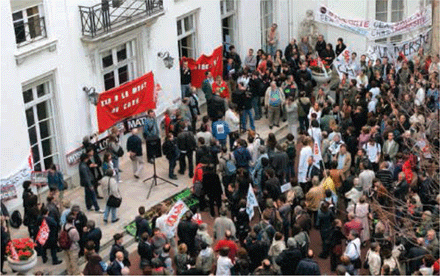|
|
|
|
|
|
|
News & Views item - June 2008 |
![]() Battles
Over Reform of French Research Set to Continue. (June 30, 2008)
Battles
Over Reform of French Research Set to Continue. (June 30, 2008)
Edouard Brézin and Antoine Triller, a professor of physics and former president of the French Academy of Sciences, and a senior researcher at INSERM, Ecole Normale Supérieure, Paris respectively, have contributed this week's editorial to Science.
They point out that France is struggling to "find ways of modernizing an [academic and research] structure that has been forged over two centuries", and this is a good thing.
The most serious problems in their view result from the "dichotomy between public universities and specialized public institutions of higher education-- the grandes écoles (the latter are selective but mainly emphasize undergraduate education), [and] a research workforce fragmented between universities and government agencies such as the Centre National de la Recherche Scientifique (CNRS) for basic sciences and the French National Institute for Health and Medical Research (INSERM)."
The authors see that worthwhile reforms are liable to be stifled because the election of university presidents is to remain with students, technicians, and professors. In those circumstances then "[w]ill the imminent new powers given to university presidents for appointing ad hoc recruitment committees with 50% external members improve the situation?
In addition the universities will not be given the power of student selection, any matriculating secondary school student has the automatic right of entrance while the grandes écoles get the best and brightest. But in 2007 for example, "only 6% of the 42,000 students of the science and engineering grandes écoles advanced into Ph.D. programs".
Furthermore, the Agence Nationale de la Recherche (ANR), established in 2005, while providing research grants on a competitive basis earmark more than 70% to programs defined a priori by the government leaving "30% devoted to broader, excellence-based programs". And as in Australia the sums allotted for oncosts are inadequate while didactic teaching loads are such as to hamper research of high quality.
In the circumstances the authors wonder if France will be in a position to attract top young researchers.
Meanwhile ructions continue at CNRS. The Sarkozy government wants to create eight new institutes within CNRS but protesters claim the real intention is to dismantle the organisation.
 |
| Under protest. Researchers and union members gathered outside and inside the headquarters of France's National Center for Scientific Research, delaying a key vote on reforms. CREDIT: HALEY/SIPA/AP PHOTO |
However, the view isn't universal; "other researchers contend that the reforms will improve CNRS and could plant the seeds for a new national institute that would unify the life sciences in France".
The government's plan is to replace CNRS's department-based structure with institutes based on scientific fields some of which could become "national institutes" making a more efficient setup according to the government.
But those opposed claim the aim is to forge a U.S.-style system in which researchers face "cutthroat competition and permanent job insecurity".
The organisation's council on a vote of 10 to 7 also have voted against the proposals. According to anthropobiologist Gilles Boëtsch, who chairs the council, breaking CNRS into distinct institutes would hamper interdisciplinary work, "a key strength".
And finally there are those with governmental influence who want gross amalgamation.
Biologist Jules Hoffmann, president of the French Academy of Sciences, told Science the time is ripe for coordinating programs at CNRS, the National Institute for Health and Medical Research (INSERM), and perhaps other government players. The creation of a strong life sciences institute within CNRS, he adds, could even be the first step toward a full-fledged merger, which could correct a fragmented structure that weakens French science.